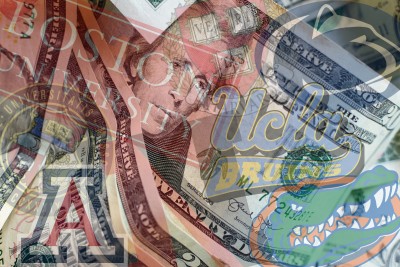Gillette released an advertisement that portrayed a man’s world Jan. 13 that included clips of men sexually harassing women. On the 30th anniversary of its slogan, “The best a man can get,” the commercial urges its customers that “men need to hold other men accountable.”
In recent years, businesses such as Gillette have started marketing projects based on social consciousness. Among these businesses include colleges such as Boston University.

ILLUSTRATION BY SARAH SILBIGER/ DFP FILE
Julia DeVoy, associate dean for undergraduate student services at Boston College’s Lynch School of Education and Human Development, said that colleges are historically intertwined with social good.
“I think higher education has always been about social responsibility and the public good. With that said, higher education is also a business,” DeVoy said. “I would argue that higher education has been the marquee business for promoting social responsibility in the world.”
Boston University has made social responsibility part of its communication strategy for years. According to BU’s 2017 Sustainability Report, the George Sherman Union food court was named the greenest food court in the nation by the Green Restaurant Association.
In addition, the university has established programs such as BU Farmers Market and a partnership between BU Dining Services and Food For Free, which donates excess food to the local community.
A 2017 Cone Communications survey found that 78 percent of Americans want companies to stand up for “important social justice issues.”
In September 2018, Nike released an ad featuring Colin Kaepernick and the message to “believe in something, even if it costs you everything” — a reference to the NFL quarterback’s protests over racial inequality, police brutality and the fact that he is currently not signed to a team.
Nike saw its online sales increase by 31 percent in the weekend after its ad went viral, according to research firm Edison Trends.
Gillette’s “The Best Men Can Be” ad, which debuted Jan. 13, has netted more than 24 million views on YouTube.
Gene Miller, an adjunct professor at the Brandeis International Business School, said Gillette knows what it is doing and likely believes the ad is good business.
“People want to know where their money is going and what they’re supporting,” said Rachel Gentile, a junior majoring in public relations and environmental science. “I think institutions and brands realize that … they need to give consumers what they want and do their best to be socially responsible, whether that was in their original plan or not.”
BU’s sustainability report lays out a commitment to make “25 percent of all food local and sustainable by 2020” and promotes the university’s new reusable to-go containers as part of an effort to reduce single-use packaging.
The university has also weighed in on political issues, releasing statements condemning violence in Charlottesville, Virginia, and President Trump’s executive order temporarily suspending travel from seven majority-Muslim countries.
Olivia Williams, a junior majoring in earth and environmental science, said taking stands on social issues can often be a balancing act for companies and universities, which face pressure to be socially responsible without venturing into political activism.
“There’s kind of a tightrope that universities walk,” Williams said. “They want to broadcast their social responsibility to students and to potential donors and people who might fund the university, but at the same time they also are often riding just a little bit behind the real forefront of these movements.”
According to the Cone Communications survey, 70 percent of Americans “believe companies have an obligation to take actions to improve issues that may not be relevant to everyday business operations.”
In April 2017, an advertisement aired that borrowed imagery from the Black Lives Matter movement and culminated with Kendall Jenner offering a police officer a can of Pepsi while protesters cheered. The commercial faced backlash and was pulled within 24 hours.
BU has also faced criticism over its sustainability efforts, including the discovery that some of its utensils were not fully compostable and its decision to “avoid” but not broadly divest from its holdings in fossil fuel companies.
BU did not respond to a request for an interview.
Williams said that universities will always be cognizant of the ideals and policies their students want to see enacted.
“Even though the universities may not always be as socially responsible as everybody would like,” she said, “I think that they definitely feel that force to move forward.”
























































































































